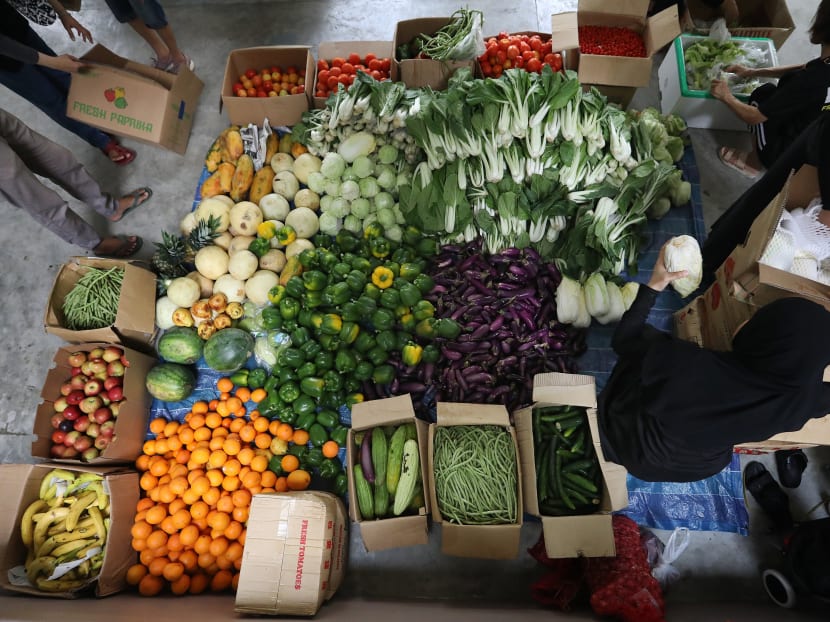Big firms may be required to report on food waste; beverage container refund scheme to start by 2023
SINGAPORE — As part of Singapore’s push to become a zero-waste nation, the Government is considering a framework that would require large commercial and industrial firms that generate huge amounts of food waste to measure and report how much of it is segregated for treatment.
- The new reporting framework would be aimed at commercial and industrial premises that produce huge amounts of food waste
- If implemented, the framework would take effect in 2024
- The framework will allow companies to know how much food waste they generate, and ensure it is properly segregated and treated
- A legislative framework for a deposit refund scheme for beverage containers will be introduced by 2022, to take effect by 2023
SINGAPORE — As part of Singapore’s push to become a zero-waste nation, the Government is considering a framework that would require large commercial and industrial firms that generate huge amounts of food waste to measure and report how much of it is segregated for treatment.
Ms Grace Fu, Minister for Sustainability and the Environment, said during a parliamentary debate on her ministry’s budget on Thursday (March 4) that industry consultations on the proposed reporting framework would start in the second quarter of this year.
The authorities said that if rolled out, the framework would take effect in 2024.
Already, since January this year, developers of new large commercial and industrial premises must allocate and set aside space for on-site food waste treatment systems in their design plans.
Under the Zero Waste Masterplan, Singapore aims to increase its overall recycling rate to 70 per cent, and is working towards the 2030 goal of reducing the amount of waste to landfill per capita per day by 30 per cent.
That target was further updated under the Singapore Green Plan 2030 announced on Feb 10, with a 20 per cent reduction target set for 2026.
The Government said that the food waste reporting framework will go some way to helping Singapore meet these goals.
Food waste is a major waste stream in Singapore due to the large amount involved and low recycling rate.
Singapore generated 744,000 tonnes of food waste in 2019, of which only 18 per cent was recycled.
Each year, commercial and industrial premises account for about 40 per cent of the food waste generated, said the Ministry of Sustainability and the Environment and National Environment Agency (NEA).
They added that the framework would not only help companies gain better awareness of the amount of food waste that they produce, but ensure it is properly segregated and treated by owners and operators of these premises.
Segregation and treatment of food waste have many benefits, said the agencies.
For instance, they allow food waste to be converted into useful products such as animal feed, fertilisers or biogas for energy generation.
This in turn reduces what needs to be incinerated, which consequently helps conserve limited landfill space.
Moreover, it minimises instances of food waste contaminating dry recyclables, thus contributing towards Singapore’s recycling efforts.
On Thursday, Ms Fu said that NEA and national water agency PUB plan to co-locate a food waste treatment facility at the Changi Water Reclamation Plant.
NEA will start a preliminary design study for the food waste treatment facility in the first half of this year.
Ms Fu said that the co-digestion of food waste and used water sludge would generate extra biogas, providing more electricity to the water reclamation plant.
The decision to co-locate the food waste treatment facility will also help reduce the carbon footprint because the waste can be collected in the east and sent to Changi, instead of Tuas Nexus in the west, she said.
TACKLING PACKAGING WASTE
Another type of waste that the agencies aim to tackle is packaging waste, which includes plastic, as it accounts for about a third of domestic waste produced here.
Plans are afoot to introduce a legislative framework for a deposit refund scheme for beverage containers by next year, with roll-out set for 2023, said Ms Fu.
She said that this framework would give industry players an opportunity to adjust to the scheme, while giving them time to set up collection and recycling infrastructure for the beverage containers.
The scheme will encourage the take-back and recycling of packaging, such as plastic bottles and aluminium cans, by giving refunds from beverage producers to consumers who return their empty drink containers to designated return points.
NEA previously noted countries that have already rolled out the scheme, such as Norway, Sweden and Germany, have managed to achieve a recycling rate of about 80 per cent.
The agencies said they would continue seeking feedback from the public and industry players in the coming months to shape the scheme’s framework.
Singapore is also studying other ways to treat plastic waste.
Preliminary studies between NEA and oil and gas company Shell have found that chemical recycling of plastic waste is technically feasible, as the polymer types found in domestic waste are suitable for pyrolysis — decomposition brought about by high temperatures.
The agencies said such chemical recycling can treat contaminated plastic waste, which cannot be mechanically recycled, into higher-value products such as pyrolysis oil. This oil can then be used to manufacture new plastic products.
The joint study also found that this in turn results in carbon savings as it keeps plastic waste away from incineration.
Separately, NEA is studying the recommendations by the Citizens’ Workgroup on Reducing the Excessive Consumption of Disposables and will provide a response next month.
The workgroup, which convened in September last year and concluded discussions in January, had provided a range of recommendations such as a mandatory carrier bag charge, incorporating education on sustainability within the school curriculum, and introducing visual cues to remind the public to bring reusables.









